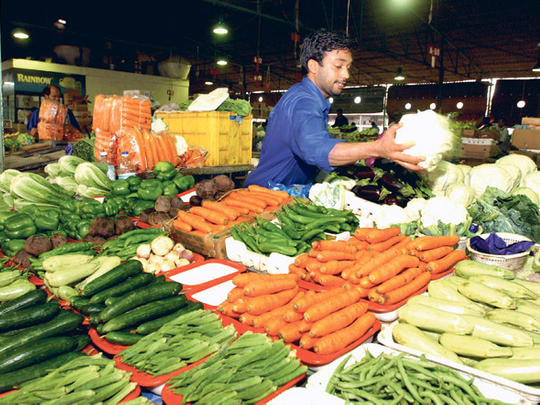
Muscat: Prices of fruits and vegetables in Oman have risen after a decision by the authorities requiring vegetable and fruit consignments coming from abroad to indicate their pesticide content.
An official at the Ministry of Agriculture and Fisheries told Gulf News that inspectors needed more time at the border to check the certificates which is causing a shortage of produce in the Omani market.
Read more:
UAE bans import of vegetables, fruits from select countries
Imported food products without certificate to be rejected
Omani suppliers said the new regulations were negatively impacting their businesses.
Ahmad Al Hinai, a supplier from Ibri province, 270km away from the capital Muscat, told Gulf News that his business has been hit hard following the new regulation.
“I used to go to Dubai every day to import food produce, but now, it’s very difficult as I need to produce residue certificate at the border,” he said.
To test samples at Dubai labs, it takes at least three days and costs around 50 riyals per test, which is both expensive and time consuming, according to him.
“I have to go to Muscat now to buy vegetables and fruits. My shop is empty and I have a family to feed, (and I have) rent and workers to pay,” he continued.
A trader at Mawaleh Market, Ahmad Al Shuaili, said that prices of food items have gone up due to the shortage and high demand especially in the month of Ramadan.
Prices of lettuce, mangoes, carrots and bananas have doubled.
Hashim Al Beloushi, Mutrah province resident of Muscat governorate, told Gulf News that he couldn’t afford to buy vegetables and fruits from local groceries due to the rocketing prices.
The new regulation was issued by the Ministry of Agriculture and Fisheries in a circular sent to all agricultural quarantine departments at the nation’s border posts.
“Importers of food crops have to submit certificates from accredited departments in the exporting countries. Food products without the certificate will be rejected and not allowed to enter the country,” said the circular.
Importers also have been asked to comply with food safety standards.
Earlier this month, the Muscat Municipality had directed all local farms to provide their specific farm labels on all their produce sold in Oman.
“It will then be easy to trace them if any problem arises,” said the municipality.
UAE ban
Starting from May 15, the United Arab Emirates banned specific Omani vegetables and fruits after discovering some of the products exceeded the maximum residue limits (MRL) of pesticides.
Pesticide levels in imported melons, watercress and carrots from Oman were found to be above the allowable limits.
The ban has resulted in losses of thousands of riyals for Omani fruit and vegetable traders.
Dr Fuad Al Sajwani, Minister of Agriculture and Fisheries, said earlier that his ministry was dealing with the parties found to be in violation of the pesticide limits.
He said monitoring of such large export supplies was very challenging.
“We export hundreds of tonnes of food products to the UAE on a daily basis. Such mistakes are likely to happen despite the fact that we always inspect products before exporting them,” the minister added.
“It is the social responsibility of Omanis to supervise the functioning of their farms, but many of them have entrusted their farms to expats,” he said.
The minister explained that there are more than 166,000 farms nationwide.
“It’s difficult to monitor all these farms, but we conduct random inspections. Last week, the ministry announced that it had increased its food inspections and that had helped them crack down on some culprits,” he affirmed.
“More than 1,600 samples taken from commercial farms nationwide were tested and we found that 98 per cent of the samples conform to internationally permissible limits of pesticides,” the ministry said in a statement.
An agreement between the UAE and Oman since 2010 stipulates that specific produce from Oman must come with a certificate indicating the amount of pesticide residue.
The measures had dramatically improved the safety of Oman’s export produce.
Oman’s agriculture sector was worth 0.9 per cent of GDP in 2016, according to the National Centre for Statistics and Information (NCSI).
Oman’s Vision 2020 has set a target of raising agriculture’s contribution to GDP to 3.1 per cent by 2020.












